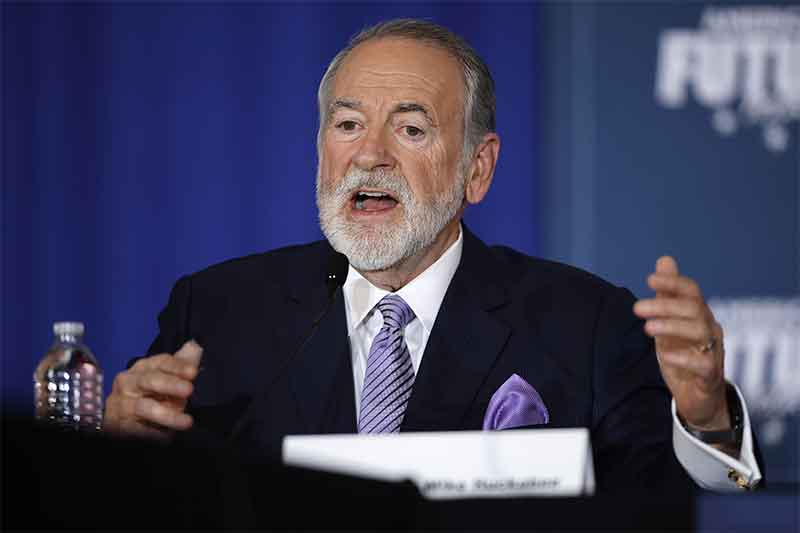
Mike Huckabee—a Baptist minister, former Arkansas governor (1996–2007), and two-time Republican presidential candidate—has long courted controversy for his polarizing rhetoric on Israel and Palestine. President Trump’s nomination of Huckabee as U.S. ambassador to Israel has ignited bipartisan concern, raising urgent questions about his capacity to navigate a role demanding diplomatic precision and respect for human rights. While Huckabee’s frequent trips to Israel (over 100 since 1973) suggest regional familiarity, his record of inflammatory statements, ideological extremism, and adherence to Christian Zionist theology renders him profoundly unfit for this critical post.
Inflammatory Rhetoric and the Erasure of Palestinian Identity
Huckabee’s public remarks reveal a disturbing pattern of denying Palestinian existence and legitimacy. In 2008, he declared, “there’s really no such thing as a Palestinian,” reducing a centuries-rooted national identity to a dismissive binary: “Arabs and Persians.” During a 2017 West Bank visit, he rejected the term “occupation,” asserting, “there’s no such thing as a West Bank… no such thing as a settlement.” Such rhetoric not only erases Palestinian self-determination but also contravenes international law, including the U.S. stance recognizing the West Bank as occupied territory. By framing Israel’s claim as a biblical “title deed” superseding modern legal frameworks, Huckabee undermines prospects for a negotiated two-state solution.
Christian Zionism and Apocalyptic Dogma
Central to concerns is Huckabee’s embrace of Christian Zionism, an ideology interpreting the Israeli-Palestinian conflict through end-times prophecy. As Lily Greenberg Call, a Jewish former Biden official, notes, this theology reduces Jews, Palestinians, and Muslims to pawns in a divine narrative where their suffering accelerates Christ’s return. According to this worldview, Palestinians must be expelled from the biblical “Land of Israel” to fulfil prophecy, after which non-Christians face annihilation or forced conversion.
Huckabee’s alignment with these beliefs—once quipping that bringing “Jesus back in glory” requires “wip[ing] out the Palestinians”—exposes a theology that dehumanizes millions. This isn’t abstract dogma; it directly informs his policy stances, including support for illegal settlements and annexation. Such positions prioritize apocalyptic ideology over human rights, posing ethical and diplomatic hazards.
Undermining U.S. Credibility and Escalating Conflict
Huckabee’s nomination risks fracturing America’s already strained credibility in the region. His vocal endorsement of Prime Minister Netanyahu’s expansionist agenda signals alignment with Israel’s far-right government, eroding the U.S. role as an impartial mediator. By dismissing international law and legitimizing settlements, he would embolden extremists on both sides, deepening cycles of violence.
Moreover, his history of anti-Muslim rhetoric—labelling Islam a religion of “murderous mayhem”—alienates Muslim-majority allies and contradicts U.S. commitments to religious pluralism. Equally troubling is how his theology instrumentalizes Jewish identity, perpetuating antisemitism by framing Jewish people as mere catalysts for Christian salvation rather than autonomous actors.
A Moral Crisis in U.S. Policy
Over 1,000 Biden administration officials recently resigned in protest of U.S. policies perceived as enabling Israeli violence against Palestinians. Appointing Huckabee would exacerbate this crisis, signalling tacit U.S. endorsement of Gaza’s humanitarian catastrophe and abandoning even rhetorical support for a “just and lasting peace.”
As ambassador, Huckabee would oversee one of America’s most sensitive diplomatic posts, tasked with balancing strategic alliances with ethical leadership. His record suggests he is incapable of this balance. Instead, his tenure would likely inflame tensions, marginalize Palestinian voices, and validate global accusations of U.S. complicity in human rights abuses.
The Path Forward: Reject Extremism, Restore Principle
The U.S. cannot entrust its Israel-Palestine policy to an envoy whose worldview is rooted in religious extremism and dehumanization. At a moment demanding nuance, empathy, and adherence to international law, Huckabee’s nomination represents a reckless departure from diplomatic norms.
Subscribe to Our Newsletter
Get the latest CounterCurrents updates delivered straight to your inbox.
Bipartisan foreign policy experts, advocacy groups, and faith leaders urge the Senate to reject his confirmation. The stakes are clear: America must choose leaders who prioritize peace over dogma, human dignity over apocalyptic fantasy, and justice over ideological conquest. Reconsidering Huckabee’s nomination isn’t just prudent—it’s a moral obligation.
Bibliography
ACLJ Staff Writers, Mike Huckabee for Ambassador: A Steadfast Ally of Israel, American Center for Law and Justice (ACLJ), February 10, 2025
Andrew Kaczynski, Mike Huckabee once said that ‘there’s really no such thing as a Palestinian’ CNN, November 12, 2024
Ben Sales, What Jewish groups are saying ahead of Mike Huckabee’s confirmation hearing, The Jerusalem Post, March 25, 2025
Imogen Garfinkel, “Who is Mike Huckabee, the pro-Israel ambassador who says ‘there’s no such thing as a Palestinian, ‘The Jewish Chronicle, November 13, 2024
Larry Brook, My Israel Story: Ambassador Mike Huckabee, Israel InSight Magazine, January 8, 2025
Melissa Langsam Braunstein, Why Huckabee is a great choice for US ambassador to Israel, The Jewish Chronicle, March 25, 2025
Nils Adler, Who is Mike Huckabee, the US evangelical, pro-settlement envoy to Israel? Al Jazeera, November 13, 2024
Rabbi Pesach Wolicki, Huckabee is the first gentile ambassador to Israel in a decade, what does it mean, Israel365 News, March 26, 2025
Yair Rosenberg, The Real Reason Trump Picked Mike Huckabee as Ambassador to Israel, The Atlantic, November 14, 2024
V.A. Mohamad Ashrof is an independent Indian scholar specializing in Islamic humanism. With a deep commitment to advancing Quranic hermeneutics that prioritize human well-being, peace, and progress, his work aims to foster a just society, encourage critical thinking, and promote inclusive discourse and peaceful coexistence. He is dedicated to creating pathways for meaningful social change and intellectual growth through his scholarship. He can be reached at [email protected]









































